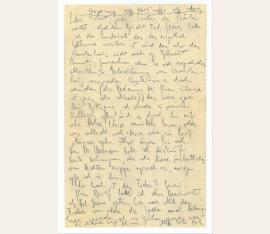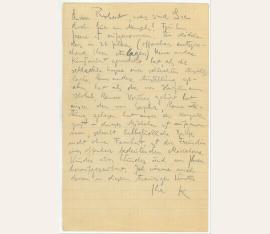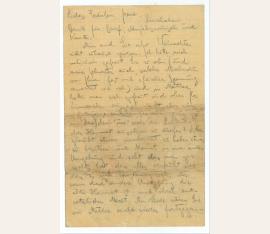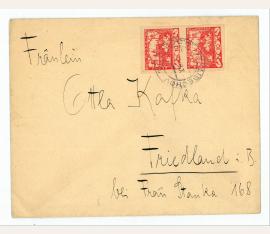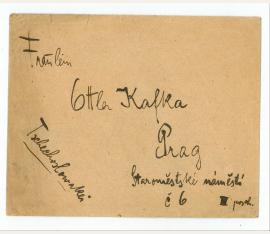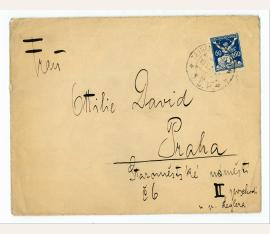Schriftsteller (1883-1924). Autograph letter signed ("K"). [Prag. 1½ SS. (30 Zeilen in Bleistift auf blau kariertem Papier). Gr.-8vo (229:145 mm).
$ 48,240 / 45.000 €
(82921/BN54291)
To his friend Robert Klopstock, a medical student and fellow sufferer of tuberculosis: "Dear Robert, just a few words, the lady waits. From the report given by Miss Irene I was under the impression that the worst was over and that a hospital could therefore be ruled out. But if you feel that a hospital might be able to give you any ease, even the slightest, we could try it after all (service at your place is undoubtedly very poor), it would not be a supplication at all, I would approach my colleague and have him intercede quite proudly or, which might be even better, go to Prof.
Münzer. So let me know. I have received a message today from Dr. Hermann, but a very brief and unclear one, mentioning a slight flu; I shall visit him tomorrow. How high is the fever? Indeed, I had already answered your letter when Miss Irene called here yesterday. The fever made the whole matter even less important than it had been already; the answer lies with me" (transl.). - Irene Bugsch, the daughter of Aladár (Alexander) Bugsch, one of the owners of the Matliary Sanitarium, belonged to Franz Kafka's circle of friends (which also included her sister Margarete and Robert Klopstock) during his half-year stay (18 December 1920 to ca. 26 August 1921) in the Tatra mountains. Then 26 years old, she applied at the Dresden Academy of Arts, an endeavor in which she received support from Kafka. The connection to Egmont Münzer (1865-1924), professor at the University of Prague since 1907, has been mediated through Kafka's cousin Robert (1881-1922), who was related to Münzer through his wife. Otto Hermann was one of the physicians whom Kafka consulted in Prague..
Schriftsteller (1883-1924). Autograph letter signed ("K"). [Prag. 1 S. (20 Zeilen in Bleistift auf blau liniertem Papier). Gr.-8vo (223:145 mm).
$ 37,520 / 35.000 €
(82923/BN54293)
To his friend Robert Klopstock, an Hungarian-born medical student with literary ambitions whom Kafka had met three years earlier at a different sanitarium, a fellow sufferer from tuberculosis: "Lieber Robert, was sind Sie doch für ein Mensch! Fräulein Irene ist aufgenommen. Ein Mädchen, das in 26 Jahren (offenbar entsprechend ihren Anlagen) keine andere Kunstarbeit gemacht hat, als die schlechte Kopie einer schlechten Ansichtskarte, keine andere Ausstellung gesehn hat als die von Hauptmann Holub, keinen Vortrag gehört hat, ausser den von Saphir, keine Zeitung gelesen hat ausser die Karpathenpost - dieses Mädchen ist aufgenommen, schreibt halbglückliche Briefe nicht ohne Feinheit, ist die Freundin eines offenbar bedeutenden Mädchens.
Wunder über Wunder und von Ihnen heraufgezaubert. Ich wärme mich daran in diesem traurigen Winter"..
Schriftsteller (1883-1924). Eigenh. Briefentwurf. [Wohl Prag. 3½ SS. auf 2 Bll. rautiertem Papier. 8vo. In Bleistift.
$ 69,680 / 65.000 €
(92342/BN61545)
Unveröffentlichter Briefentwurf an "Fräulein Irene", d. i. Irene Bugsch: "Nun sind Sie also Weihnachten nicht zuhause gewesen. Ich hätte mich natürlich gefreut Sie zu sehn (und meine Schwester auch, welche Nachrichten von Ihnen fast mit gleicher Spannung erwartet wie ich) und in Matlar hätte man sich gefreut und oben Ihr Zimmerchen ausgeschmückt, aber wäre es gut gewesen? Sind Sie schon genug fest [?] in Dresden um sich der Lockung der Heimat aussetzen zu dürfen? Man glaubt etwas erarbeitet zu haben, etwas zu besitzen und kommt in eine andere Umgebung und sieht dass man gar nichts hat, dass alles verfrüht war dass es nur Täuschung war.
Gar wenn diese andere Umgebung die alte Heimat ist mit ihrer entsetzlichen Macht. Am Ende wären Sie von Matlar nicht wieder fortgegangen (freilich Klopstock ist noch dort, sie fortzuschicken). Und ausserdem: Sie haben doch bisher soweit man es von der Ferne sehen kann, (freilich man sieht von der Ferne gar nichts und es ist sehr dumm so zu schreiben) fast ohne Kampf alles erreicht, solche Schulerfolge - es sind Erfolge, das ist kein Zweifel - Erfolge in der Schule und bei Menschen - und schon wollen Sie sich belohnen und nachhause fahren? Nicht früher, liebes Fräulein Irene, ehe nicht Rade zu einer Zeichnung sagt: 'Die ist aber ganz miserabel.' Freilich, wenn Sie darauf warten sollten kämen Sie vielleicht niemals nach hause [...] Die Ansichtskarte bringt mir wieder zu Bewusstsein, was für einen riesigen Sprung (nicht der Höhe nach, ich will nicht beurteilen, aber der Entfernung nach) Sie liebes armes Fräulein in so kurzer Zeit haben machen müssen, etwa aus der Ausstellung des Hauptmann Holub bis zu dieser Ansichtskarte. Frauen können mehr als Männer. Mich nehme ich dabei übrigens nicht zum Vergleich, ich habe, trotzdem ich einmal Kunstkritiker der Karpathenpost war, überhaupt, wie ja viele Menschen wahrscheinlich, keinen primären Blick für die bildende Kunst. Ich liebe an Bildern nur die Liebe, die sie in Menschen primären Blicks erweckt haben (soweit ich diese Menschen erfassen kann) Und das braucht Zeit. Gegenüber dem Bild von Klee z. B. bin ich fast gleichgültig. Die Farben würden wohl nicht viel ändern. Ach, Rade (trotzdem ihm wahrscheinlich Klee gar nicht gefällt) würde mir niemals sagen [bricht ab]". - Irene Bugsch, die Tochter von Aladár (Alexander) Bugsch, einem der Mitinhaber des Sanatoriums in Matliary, gehörte neben ihrer Schwester Margarete und Robert Klopstock zu Kafkas engerem Freundeskreis während seines halbjährigen Kuraufenthalts (18. Dezember 1920 bis etwa 26. August 1921) in der Tatra. Damals sechsundzwanzigjährig, hatte sie sich im Herbst 1921 um die Aufnahme an der Dresdner Kunstakademie (später Staatliche Akademie für Kunstgewerbe) beworben und war dabei von Kafka, der sie allerdings für vollkommen untalentiert hielt, unterstützt worden. - Hauptmann Anton Holub, ein tschechischer Offizier, war wie Kafka und sein Freund Klopstock Patient des Sanatoriums in Matliary und dilettierte als Musiker und Künstler; eine Ausstellung seiner Landschaftsbilder hatte Kafka anonym und nicht ganz ernsthaft im April in der deutschsprachigen "Karpathen-Post" besprochen (Jg. 42, Nr. 17 vom 23. IV. 1921). - Carl Rade lehrte als Professor an der Kunstgewerbeakademie Dresden und stand dort u.a. den Fachklassen für Porzellanmalerei, für Textilkunst und der Modeklasse vor. - Etwas angestaubt, gebräunt und knittrig, der Text ist im Großen und Ganzen jedoch einwandfrei lesbar..
Schriftsteller (1883-1924). Briefkuvert mit eigenh. Adresse und Absender. Liboch. Qu.-8vo.
$ 11,256 / 10.500 €
(92356/BN61605)
An "Fräulein Ottla Kafka | Friedland i. B. | bei Frau Stanka 168". Kafkas jüngste Schwester hatte ab November 1918 eine landwirtschaftliche Schule im nordböhmischen Friedland besucht. Im März 1919 kehrte sie nach Prag zurück; mehrere Versuche, eine Stellung in einem landwirtschaftlichen Betrieb zu finden, scheiterten. Kafkas vollständige Absenderangabe lautet "Dr Kafka Pension Stüdl | Schelesen b. Liboch". - Frankiert, vorsichtig an den Laschen geöffnet. Unbedeutende Gebrauchsspuren.
Schriftsteller (1883-1924). Briefkuvert mit eigenh. Adresse und Absender. Meran-Untermais. Qu.-8vo. Mit einer Beilage (s. u.).
$ 11,256 / 10.500 €
(92649/BN61941)
An "Fräulein Ottla Kafka | Prag | Staromestské námestí | c 6 III posch[odí]". Kafkas vollständige Absenderangabe lautet "Dr Kafka | Meran-Untermais | Pension Ottoburg". Kafka hatte während seines Kuraufenthaltes in Meran vom 6. April bis zum 28. Juni 1920 nach einigen Tagen im Hotel Emma in der Europaallee in der Pension Ottoburg in Untermais logiert und sollte dort fast drei Monate bleiben. - Etwas gebräunt und mit unbedeutenden Gebrauchsspuren; die Briefmarke zur Gänze erhalten. Beiliegend ein an dieselbe adressierter Umschlag (Poststempel: Prag 30.
IV. 1917) ihrer Kusine Irma Kafka nach Zürau, wo Ottla von Mitte April 1917 bis zum Herbst 1918 das landwirtschaftliche Gut ihres Schwagers Karl Hermann bewirtschaftete. Von September 1917 bis April 1918 sollte sie dort auch ihren Bruder aufnehmen, der nach dem Ausbrechen seiner Lungenkrankheit auf dem Land Erholung suchte. Irma war die zweite Tochter von Ludwig Kafka, dem jüngsten Bruder von Ottlas Vater Hermann. Sie arbeitete damals im Geschäft der Kafkas am Altstädter Ring..
Schriftsteller (1883-1924). Briefkuvert mit eigenh. Adresse und Absender. Matliary. Qu.-8vo.
$ 10,184 / 9.500 €
(92650/BN61942)
An "Frau Ottilie David | Praha | Staromestské námestí | c 6 | II poschodí | u p[ana] Leglera". Kafkas vollständige Absenderangabe lautet "Dr Kafka | Tatranské Matliary | Villa Tatra | Slovensko". Kafkas jüngste Schwester hatte am 15. Juli 1920 den katholischen Tschechen Josef David geheiratet. - Etwas knittrig und mit kleinen zeitgen. Notizen von anderer Hand.
sold
Eigenh. Brief mit U. ("Kafka").
Autograph ist nicht mehr verfügbar
To the Prague-based writer Rudolf Fuchs in Vienna, announcing his arrival and asking him to reserve a room for him. - On 11 July, Kafka and Felice Bauer had started on a journey via Budapest to Arad in Romania, where they visited Felice's sister Else Braun. Kafka returned on his own and arrived in Vienna on July 16 at 9.30 p.m. Afterwards he and Rudolf Fuchs went to the Café Central; two days later he (and Austrian writer Anton Kuh) took the overnight train to Prague.
Tschechoslowakischer Reisepass mit eigenh. U. ("Dr. F. Kafka František").
Autograph ist nicht mehr verfügbar
Franz Kafka's last passport, which the writer used for all his international travels during the last two years of his life - including his final one, to the Kierling Sanitarium near Vienna, whence he never would return. A tremendously personal and evocative item of bureaucratic residue, this passport (number 20,000) bears Kafka's written name five times (including his signature), specifies various locations in Germany and Austria, and gives Kafka's physical description (shape of face: "longish"; colour of eyes: "brown-grey") and his profession as an insurance officer. Less than two weeks after the passport was issued, Kafka would be retired due to his tuberculosis. The document's validity was extended twice: first until 16 June 1924, then until the end of that year. Kafka would not live to see either date. - The passport records his summer trip to the Müritz resort on the Baltic Sea as well as his 1923/24 stay in Berlin and his registration at the apartment of Carl Busse's widow in Zehlendorf, where the ailing writer lived with Dora Diamant - the single period in his life during which Kafka shared quarters with another person in a relationship. Passport stamps record Kafka's return to Prague (with Dora) on 17 March; the Austrian visa is on the last stamped page. - Kafka died on June 3rd in the presence of his friend Robert Klopstock (1899-1972), whom he had met as a fellow patient at a Slovakian sanitarium in 1921. Klopstock, by 1924 a medical student, kept the passport and took to with him when he emigrated to the U.S. in 1938. Having found a position as a lung surgeon at Long Island's Triboro Hospital with the help of Thomas Mann and Albert Einstein, he advised Kafka's former publisher Salman Schocken on Kafka's biography and provided him with his Kafka correspondence. Schocken had repeatedly and generously supported the ever-indigent Klopstock; the passport, which reached his office in September 1946 by registered mail, was probably a token of Klopstock's gratitude. It may have been the publisher who removed the now-missing photograph for reproduction. Schocken, who later acquired Kafka's letters to Felice Bauer from Kafka's first fiancée, gave the present item to his friend and former employee Gerda Schulz (1915-2013), whose heirs sold it to the trade. - Slight edge defects; spine beginning to tear; insignificant traces of rusty photo staples.
Autograph letter signed (“Kafka”).
Autograph ist nicht mehr verfügbar
Eigenhändiger Briefumschlag mit Absenderangabe „Dr. F. Kafka“.
Autograph ist nicht mehr verfügbar
Much lauded and influential Czech-born writer whose man-turned-insect story Metamorphosis (1915) and novel The Trial (1925) have earned a permanent and prominent place in the canon of modern literature. The envelope is addressed to his fiancee in Berlin, "Fraulein Felice Bauer, per Adr. Carl Lindstrom A.-G., Berlin 0-17," and signed in the return address on the flap, "Abs. Dr. F. Kafka, Prag. Poric 7," postmarked March 10, 1913. In fine condition. Kafka met Felice Bauer for the first time in August 1912 at a dinner hosted by his friend Max Brod, and he soon began to send her letters almost daily. These were eventually collected and published as Letters to Felice. Lasting from September 1912 to October 1917, Kafka’s correspondence with Bauer overlapped with his writing The Metamorphosis, In the Penal Colony, and the beginning of his work on The Trial. He first asked for her hand in marriage shortly before the postmark date of this envelope, in a meandering letter of over twenty pages long that took him days to compose. Then, in a letter written from June 21st to 23rd, he explained that he feared she would be unhappy with him as a husband, especially if she could not tolerate his intense writing schedule. In a different letter, dated to June 23rd alone, Kafka expressed disgust with members of his family. One of these—both lending exceptional insight into Kafka's complex mind and his personal relationships—must have been the letter sent in this envelope. Despite two engagements during their period of correspondence, Kafka and Bauer would never marry. Few of Kafka's works were published during his lifetime, and he passed away in obscurity from tuberculosis at age 40. His autograph is thus exceptionally rare and of the utmost desirability.

